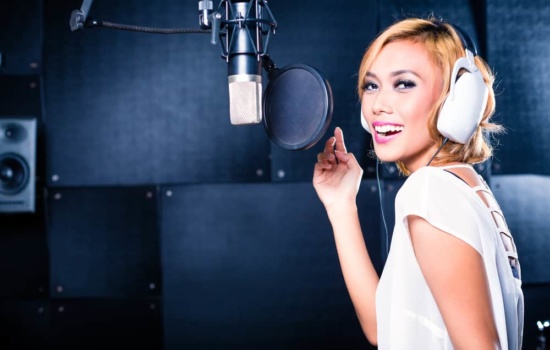One of the toughest parts about being a singer is doing singing auditions.
These are the job interviews for singers. And they’re never easy, no matter how many times you go out for one.
But you need to learn how to do well at auditions so you can get the gigs that further your singing career.
Choosing the right audition songs is a crucial step when it comes to showcasing your vocal talent and making a lasting impression on casting directors or judges.
The ideal song selection can (and needs to):
- Highlight your strengths
- Demonstrate your range
- Capture the essence of the character or style you’re auditioning for
Before selecting an audition song, it’s important to understand the context of the audition.
Research the production, show, or role you’re auditioning for.
Consider the genre, time period, and themes of the production.
This will help you choose songs that align with the overall style and atmosphere of the show, making it easier for casting directors to envision you in the role.
Select songs that highlight your vocal strengths and abilities.
Consider the range, tone, and style of your voice.
Choose songs that allow you to demonstrate your vocal range, power, control, or unique qualities.
Showcase your strengths, whether it’s belting high notes, performing intricate vocal runs, or conveying emotion through your voice.
By selecting songs that complement your voice and what you can do with it, you can present yourself as a confident and capable performer.
If you’re auditioning for a specific character, choose songs that capture the essence of who that person is.
Analyze the character’s personality, emotions, and journey, and select tunes that reflect those qualities.
If the production has a specific theme or message, consider going with songs that align with that theme or convey a similar idea.
This demonstrates your ability to connect with the material and brings authenticity to your performance.
Pay close attention to any specific requirements or restrictions outlined in the audition notice.
Some auditions may have limitations on song length, genre, or language. Ensure that your chosen songs adhere to these guidelines.
Additionally, if the audition requires a specific type of song, such as a ballad or an up-tempo piece, be sure to select songs that fit the requested style.
Even if you feel some other track would be better, don’t go against what they’ve asked for, since they’re the ones who can give you the job (or not).
While it’s important to choose songs that are appropriate for the audition, it’s also beneficial to make unique song choices that stand out.
Avoid overly popular or overdone songs that casting directors may have heard numerous times. Look for lesser-known songs or hidden gems that still suit the context of the audition.
This can demonstrate your creativity and originality, leaving a lasting impression on the audition panel.
Preparing for an audition goes beyond just rehearsing your lines or perfecting your performance.
Your mental state and mindset play a significant role in your ability to showcase your talent confidently and deliver a captivating audition.
The steps below should help you prepare mentally for an audition…
Visualization is a powerful technique that can help you mentally prepare for an audition.
Take some time each day to visualize yourself performing exceptionally well during the audition. Imagine yourself confidently delivering your lines, hitting the right notes, and connecting with the audience or casting directors.
Visualizing success can help build confidence, reduce anxiety, and mentally prepare you for the actual audition. It may seem silly to some, but this can really be helpful.
Auditions can be nerve-wracking, and it’s crucial to manage anxiety and stress to perform at your best.
Practicing mindfulness and relaxation techniques can help calm your mind and body before an audition. For example:
- Deep breathing exercises
- Meditation
- Progressive muscle relaxation
These can help you stay present, reduce tension, and improve focus.
Incorporating these techniques into your daily routine leading up to the audition can help you develop a sense of calm and mental clarity for when it’s time to perform.
Maintaining a positive mindset is essential for audition success.
Replace self-doubt and negative thoughts with positive affirmations and beliefs in your abilities.
Remind yourself of your unique talents, strengths, and past accomplishments.
Surround yourself with a support system of family, friends, or mentors who uplift and encourage you.
Remember that auditions are an opportunity to showcase your skills, and even if the outcome isn’t what you expected, it doesn’t define your worth as an artist.
While it’s essential to be optimistic, it’s equally important to manage your expectations realistically.
Understand that not every audition will result in success, and that’s okay. Auditions are learning experiences, and each one brings valuable insights and opportunities for growth.
By focusing on the process rather than solely on the outcome, you can alleviate unnecessary pressure and perform more authentically.
One of the most effective ways to boost your confidence and mental preparedness is through thorough preparation and rehearsal.
Ensure that you have thoroughly studied the material, whether it’s a script, song, or dance routine. Practice consistently and familiarize yourself with every aspect of the audition.
The more prepared you are, the more confident you will feel walking into the audition room.
Nervousness before an audition is natural and can even be beneficial.
Instead of trying to eliminate all nervous energy, learn to embrace and channel it. Recognize that the adrenaline rush can heighten your performance and bring an extra level of energy and excitement to your audition.
Use that nervous energy as fuel to deliver a dynamic and engaging performance.
Preparing for an audition has both a mental and a physical side, and if you want to succeed, you should pay ample attention to both.
Your physical preparation plays a crucial role in delivering a stellar audition.
By taking care of your body and ensuring physical readiness, you can showcase your talent with confidence and energy.
A healthy lifestyle sets the foundation for physical preparedness.
Prioritize nutritious meals, ensuring a well-balanced diet that includes fruits, vegetables, lean proteins, and whole grains.
Stay hydrated by drinking plenty of water throughout the day to maintain optimal energy levels.
Adequate sleep is also essential for physical and mental well-being, so aim for seven to eight hours of quality sleep each night.
Regular exercise is crucial for building stamina, strength, and flexibility, all of which are important for auditions.
Engage in a fitness routine that suits your preferences and goals.
Cardiovascular exercises like running, swimming, or dancing can improve your endurance.
Strength training exercises, such as weightlifting or bodyweight exercises, can enhance your overall strength.
Don’t forget to include stretching and flexibility exercises to improve your range of motion and prevent injuries.
If you’re a vocalist, work on exercises that help with breathing, which is key!
If you’re auditioning for a singing role, vocal warm-ups and exercises are essential.
These activities help warm up your vocal cords, improve breath control, and enhance your vocal range.
Prior to auditions, spend time practicing scales, vocal exercises, and gentle humming to warm up your voice.
Additionally, incorporate regular vocal training and lessons to maintain and improve your singing skills.
Your physical presence is crucial in auditions, and your posture and body language can greatly influence how you are perceived.
Practice good posture by keeping your spine straight, shoulders relaxed, and head held high.
Stand or sit with confidence, exuding poise and presence.
Body language that conveys openness, engagement, and authenticity can make a strong impression on casting directors.
If your audition involves dance or movement, dedicate time to rehearse and refine your choreography.
Focus on mastering the required steps, transitions, and synchronization. Practice in front of a mirror to assess your form, alignment, and overall performance.
Additionally, incorporate exercises that improve agility, coordination, and balance to enhance your overall movement quality.
Personal grooming and appearance should not be overlooked when preparing for an audition.
Pay attention to personal hygiene, ensuring clean hair, nails, and teeth.
Select appropriate audition attire that aligns with the role and showcases your professionalism. Consider the specific requirements or expectations outlined in the audition notice and ensure your appearance aligns with them.
When it comes to auditions, your talent and preparation are undoubtedly crucial, but there’s more to winning one than that.
The way you present yourself can also make a significant impact on casting directors and potential employers.
Choosing the right attire can help you convey professionalism, confidence, and a clear understanding of the role you’re auditioning for.
While it’s essential to dress for the role, it’s equally important to keep your outfit simple and versatile.
Avoid excessive accessories, flashy colors, or busy patterns that may distract from your performance. Instead, choose solid colors and classic styles that highlight your features and allow your acting abilities to take center stage.
Additionally, opt for clothing that allows you to move freely and comfortably, as auditions may involve physical activities or improvisation.
Finally, it’s essential to research and understand the expectations of the production or casting agency you’re auditioning for.
Some may provide specific guidelines or preferences regarding attire, which should be followed accordingly.
If no specific instructions are given, it’s always better to err on the side of dressing slightly more formal than casual, as it demonstrates your professionalism and respect for the process.
You’ve just finished your singing audition, and regardless of how it went, there are still important steps to take after you leave the audition room.
What you do next can greatly impact your chances of success–either immediately or down the line–and leave a positive impression on casting directors or industry professionals.
After the audition, take some time to reflect on your performance. It’s natural to analyze what went well and what could be improved.
Be honest with yourself but avoid dwelling excessively on any perceived mistakes.
Use the experience as an opportunity for growth and learning. Take note of areas you excelled in and aspects that need more attention in future auditions.
Self-reflection can help you develop and refine your skills as a singer.
Expressing gratitude is an important part of post-audition etiquette. Whether you auditioned in front of a casting director, a panel of judges, or a production team, always thank them for the opportunity to audition.
A simple thank-you email or note shows your professionalism and appreciation for their time and consideration. Keep your message concise, genuine, and gracious, highlighting specific aspects of the audition or the chance to showcase your talent.
Write these for them, and don’t use a form message, as these people can probably tell.
Regardless of the outcome, it’s crucial to maintain a positive attitude and keep moving forward. Rejection is a common part of the audition process, and it’s important not to let it discourage you.
Use the experience as motivation to work harder and continue pursuing your singing career.
Remember that success in the industry often requires persistence and resilience. Even the best of the best failed to secure parts and didn’t do well in some auditions.
If possible, inquire about receiving feedback on your audition. Some auditions may offer this option, while others may not.
Feedback can provide valuable insights into your performance, helping you understand areas where you can improve.
However, keep in mind that not all auditions have the resources or time to offer feedback. If it is available, be open to constructive criticism and use it to enhance your skills for future auditions.
And always thank them if they do give you any notes, since many won’t bother and they certainly don’t have to.
After an audition, it’s essential to keep honing your singing skills.
Consider taking vocal lessons or participating in workshops and classes that focus on areas you identified during your self-reflection.
Continued training will not only improve your abilities but also show your dedication to growth and development as a singer, and all that work may help you land the next audition.
Networking is another critical aspect of building a singing career.
Connect with other professionals in the industry, attend industry events, and join relevant online communities. Try and stay in touch with those who were at the audition you just attended, and especially those who ran the show.
Building relationships can lead to future opportunities and increase your visibility within the industry.






